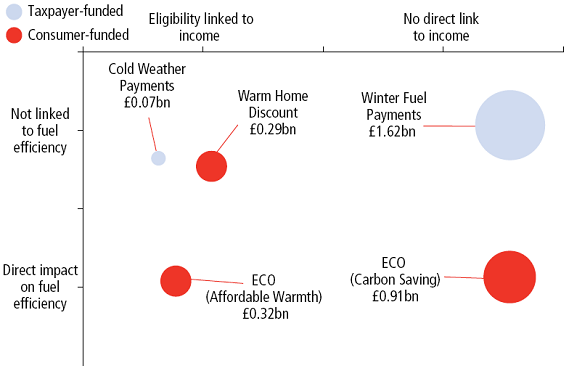Evidence Submission: The Green Deal – the Effect on Public Health
Extensive research has shown fuel poverty has a negative impact on health.1 The recent Marmot review concluded that fuel poverty is avoidable and contributes to social and health inequalities.2
The graph below shows that the number of excess winter deaths has remained at a level of around 25,000 deaths per year.3
According to the Department for Energy and Climate Change (DECC) the “Green Deal financial mechanism eliminates the need to pay upfront for energy efficiency measures and instead provides reassurances that the cost of the measures should be covered by savings on the electricity bill.”4 This is achieved by removing the upfront cost of installation and instead passing this on to green deal providers who then recoup the cost through energy bills. The idea being that the savings made will be greater than any increase in energy bills.
We show how these changes could be detrimental to people in fuel poverty.
Changes in Funding
Currently fuel poverty related policies are funded by 3.82 billion pounds from taxpayers and 0.92 billion pounds from consumers through energy bills.
Levels of funding for fuel poverty related policies – 20095The following graph shows projected changes in the sources of funding, with 1.69 billion pounds coming from tax payers and 1.52 billion pounds being consumer funded. There is a reduction in the proportion funded by taxpayers and a total reduction of 1.53 billion pounds.
Levels of funding for fuel poverty related policies – 2016 (2009 prices)6
The situation is more complex than simply a reduction in the total funding. The shift from tax payer funding to consumer funding will mean that more money supplementing these schemes will be sourced from energy bills as opposed to taxes. The poorest in society pay less in tax than the rich but this is not the case with energy bills with the lowest earners spending 7% of their income on energy, compared to 3% for the wealthiest.7 Therefore, more emphasis on consumer funded schemes will have a greater impact on lower income households than taxpayer funded schemes. This may lead to more households falling into fuel poverty by increasing bills to fund schemes.
As part of the Green Deal, the ‘golden rule’ applies whereby the residents bills would not increase because of savings made. Therefore, households are taking on debt with added interest, possibly at rates around 7% 8 whereas previously measures may have been fully funded by schemes such as Warm Front.
Some of the most vulnerable in society live in some of the poorest quality accommodation. These residents may not be aware of the new funding and may not wish to take on additional debt, even if it leads to savings over time.
Conclusion
Any change in policy that takes direct funding away from those in society with the lowest income, living in properties with the poorest energy efficiency is likely to have a negative impact on health.
There is a long established link between housing and health. The outline of the new Green Deal does not appear to be aimed at helping the most vulnerable remain healthy in their homes. Only time will tell what impact this has on the health of the nation and the impact on health services.
Evidence Submission by: Dr Alice Mason, Core Medical Trainee, Imperial Trust; Christopher Johnes BSc, Senior Environmental Health Officer, Islington Council.
References
1. Rudge J. & Gilchrist R. Excess winter morbidity among older people at risk of cold homes: a population-based study in a London borough. Journal of Public Health. 2005; Vol. 27, No.4: 353-358.
2. Marmot Review Team. The Health Impacts of Cold Homes and Fuel Poverty. University College London. 2011.
3. Excess winter mortality in England and Wales, 2010/11 (provisional) and 2009/10 (final). Office for National Statistics. London. 2011.
4. Department of Energy and Climate Change. Green Deal. http://www.decc.gov.uk/en/content/cms/tackling/green_deal/green_deal.aspx (accessed 15 May 2012).
5. John Hills. Getting the measure of fuel poverty – Final Report of the Fuel Poverty Review. Department of Energy and Climate Change. London. 2012.
6. John Hills. Getting the measure of fuel poverty – Final Report of the Fuel Poverty Review. Department of Energy and Climate Change. London. 2012.
7. Department of Energy and Climate Change. Annual Report on Fuel Poverty Statistics 2012. London. 2012.
8. Department of Energy and Climate Change. Green Deal and the Energy Company Obligation – Impact Assessment. London. 2011.




Leave a Reply